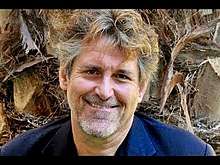
Steven Best (born December 1955) is an a writer, speaker, intellectual, and activist working in animal rights, species extinction, human overpopulation, ecological crisis, biotechnology, liberation politics, terrorism, mass media and culture, globalization, and capitalist domination. He is Associate Professor of Humanities and Philosophy at the University of Texas, El Paso.
Quotes
- Whereas the unconscious operations and blind forces of the planet have provoked turbulent changes over the last 4.5 billion years of earth’s evolutionary history, now change is being directed by a conscious and volitional agent – "humanity." We cannot speak of humanity equally, to be sure, as the problem was caused by the industrialized capitalist West and the poorer nations who contributed least to climate crisis will be hit the hardest. But nations such as China, India, and Brazil are major contributors, and the cumulative impact of 7.5 billion people on the planet is causing extinction and collapse everywhere. The stability of the Holocene is now gone, changes are accelerating beyond our understanding and control, and chaos waits at our door.
The Politics of Total Liberation: Revolution for the 21st Century (2014)
- The omnicidal regimes of 'civilization' and global capitalism have reached their zenith and will end - whether through an ascendent global resistance stronger than this dying world system, or through the cataclysmic adjustments the planet already has initiated, such as those that will ensure its evolution for billions of years to come.
- Preface: "Crisis and the Crossroads of History" (p. xiii)
- A politics of total liberation could forge alliances more positive and powerful than anything yet created. It could emancipate not just one class, interest group, or even the entire human species from the grip of a nihilistic power elite (that value nothing but power and profit), but also animal communities everywhere, ecosystems worldwide, and the dynamic energies of evolution and speciation currently blocked by human "progress."
- Preface: "Crisis and the Crossroads of History" (p. xiv)
- If physical force is needed to save an animal from attack, then that force is a legitimate form of what I call "extensional self defense." This principle mirrors US penal code statutes known as the "necessity defense," which can be invoked when a defendant believed that an illegal act was necessary to avoid great and imminent harm. One only needs to expand this concept slightly to cover actions that are increasingly desperate and necessary to protect animals from the total war against them.
- Chapter 3 "The Paralysis of Pacifism: In Defense of Militant Direct Action" (p. 68)
- Unless the intensity of our defense of life matches the ferocity of the assault against it, we allow a greater violence to grow exponentially until an earth once teeming with life becomes a mass graveyard, a battered wasteland, and a toxic cesspool. Then, when it is finally too late, the unfortunates who remain will grasp what the radicals tried to convey: what the logic of growth and capitalism finally wrought, the colossal failure of human vision and will, and the complicity of pacifism with the greatest violence of all.
- Chapter 3 "The Paralysis of Pacifism: In Defense of Militant Direct Action" (p. 78)
- Attacking the new slave economy as it does, the animal liberation movement is a significant threat to global capital. Animal liberation challenges large sectors of the capitalist economy by assailing corporate agriculture and pharmaceutical giants and their suppliers. Far from being irrelevant to social movements, animal rights can form the basis for a broad coalition of progressive social groups and drive changes that strike at the heart of capitalist exploitation of animals, people, and the earth.
- Chapter 4 "Rethinking Revolution: Veganism, Animal Liberation, Ecology, and the Left" (p. 103)
- There can be no full or even adequate understanding of the systemic problems of capitalist society, of the origins and dynamics of hierarchy, and of a future rational, autonomous, ethical, and ecological society until we address the 10,000-year legacy of speciesism and the barbaric exploitation of other animals.
- Chapter 5 "Minding the Animals: Cognitive Ethology and the Obsolescence of Left Humanism" (p. 135)
- We now face the grim choice posed by revolutionaries over the last two centuries, which involved "revolution or barbarism." Our situation has deteriorated so dramatically that we must choose between revolution or ecological collapse, mass extinction, and possibly our own demise. The twenty-first century is a time of reckoning.
- Conclusion: "Reflections on Activism and Hope in a Dying World and Suicidal Culture" (p. 162)
External links
This article is issued from
Wikiquote.
The text is licensed under Creative
Commons - Attribution - Sharealike.
Additional terms may apply for the media files.